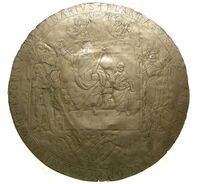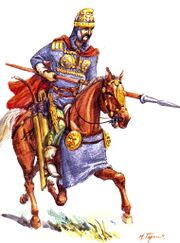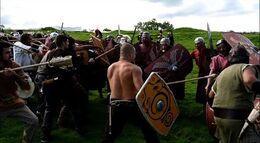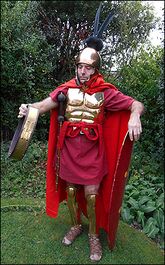Aspar
Aspar (401 – 471) was a German-Alan-Persian soldier in the Roman Empire who ruled as a shadow emperor in Constantinople from the mid 420s. His dominance was near-complete, with the subtle but important exception of being able to keep from being murdered. His decisive influence engineered the promotion of Marcian and Leo I as emperors, though his long-term goal was to place his own sons on the Imperial throne. In this, he was behaving like other barbarian or semi-barbarian strongmen during this time period, such as Stilicho and Aetius.
Early career[edit]
Aspar's rapid rise to power came via his family, a motley bunch of Germans, Goths, Alans, and Persians, the latter responsible for Aspar's name, all pursuing military careers. He was also an Arian Christian, opposed to the Nicene variety with its three-in-one God theology. This made sense when dealing with other Germanic tribes of a similar persuasion, as Aspar could assemble an "Arian Brotherhood." Later, when the Nicene Christians fell out amongst each other, Aspar could stand aside and offer any required "conversions."
His first major expedition was in the Western Roman Empire in 425 under the command of his father Ardabur. Their mission on behalf of Emperor Theodosius II was to displace a usurper and restore the emperor's aunt Galla Placidia and his cousin Emperor Valentinian III. However, the expedition hit a snag when Ardabur was captured by Emperor Ioannes (the said usurper) when his ship broke up in a storm.
Aspar managed to rescue his father by suggesting that his boss Theodosius would be "lenient" with Ioannes if he didn't do anything nasty (like murdering him). Ioannes listened to Aspar but Galla didn't. Once Galla defeated Ioannes, she had him mutilated, paraded around an arena, and then executed. Aspar returned to Constantinople after this laboratory course in duplicity.
Emperor Theodosius was pleased with the outcome, eventually making Aspar a magister militum — a general with his own staff chariot. He was used in other military campaigns, including one against the Vandals in North Africa, where he made the acquaintance of King Gaiseric, a man any Roman in government wished to have on speed-dial.
Friends in high places[edit]

By the mid-430s, Aspar was a fixture at the Imperial Court at Constantinople. To blend in with the hosts, he gussied up his name to the pompous Flavius Ardabur Aspar. The change fooled no one, except one simple-minded Marcian from Thrace. Aspar had rescued his ass from the Vandals when he was caught defending Hippo in North Africa. Murky dealings between Aspar, Marcian and Gaiseric might explain Aspar's curious relationship with the Vandals later on.
As an Arian, Aspar avoided the theological battles at Ephesus in 431, as well as the replay without a penalty shoot-out in 449, between rival Trinitarian Christians. He was entertained by the verbal and physical abuse among bishops and rank[1] holy men.
In 450, Emperor Theodosius died after a sudden fall off his horse. His sister, Empress Pulcheria, sought the job, but the rules required her to co-rule with a man. Aspar immediately nominated "My Favorite Marcian," and the newly installed emperor promptly returned the favor with a doubling of Aspar's stipend. However, back in those days, new spending had to be "paid for," and this kiss-in-the-mail came at the expense of the one the Eastern Empire had been sending Attila the Hun not to attack. Attila was pissed.
Go West, Young Hun[edit]
The triple walls of Constantinople were enough to persuade Attila not to try his luck, but the rest of the Balkans had no walls at all. The Huns did go West to burn and pillage — doubly good for Aspar, as their victims in the Western Roman Empire under its military leader Aetius and nominal emperor Valentinian III were distracted from making an unwanted house call in the East. Valentinian's wife Licinia was, after all, the daughter of Theodosius.
The plan worked until Attila was defeated at the Battle of Chalons and shortly after, choked to death on his own vomit. Though freed from the Huns, Aetius was unable to take on Aspar, because Valentinian took on Aetius first. After the death of Aetius, chaos was endemic: The Vandals painted their name in lights and sacked Rome. Aspar and Marcian sat and watched, though doing no fiddling; and presently it was Marcian's turn to drop out of the picture.
The new vacancy would ordinarily be filled by a member of the Theodosian dynasty. Annoyingly, there were now none left alive in Constantinople. Marcian's daughter Marcia Euphemia did hint that she and her pompous husband Anthemius merited the honor, but they had no immediate takers. Everyone knew that Aspar was the real power-broker; he could have nominated himself or either of his two "little Aspies," Ardabur and Patricus ("Pat"). However, the times called for another illiterate soldier, the Thracian called Leo, accompanied by his very pushy wife Verina. Surely they would be no trouble.
Marrying up[edit]
Aspar's position as the effective ruler of the Eastern Roman Empire endured for years. However, Emperor Leo chafed at the Military-Barbarian Complex that controlled the empire. He recruited roughnecks, a tribe in Anatolia known as the Isaurians, led by Zeno, who quickly became a rival to Aspar. Leo reckoned that his two subordinates would be too busy fighting each other to unite against him. He reckoned right.
The first dent to Aspar's control came when his eldest son Ardabur was accused of treachery on the Eastern Front with Persia. He was downgraded by Leo. Aspar kept his job, but had to watch Zeno go one better and marry the emperor's eldest daughter Ariadne in 466. Leo now felt free of his mentor and kibitzed in the Western Roman Empire, sending Anthemius to Rome as emperor.[2] East and West allied against the Vandals, and conversely, Gaiseric's pirate band did not care which half of the Roman Empire they raided, raping and pillaging pretty much being as much fun anywhere. Rome supplied soldiers for an invasion of the Vandal kingdom and ships were ordered, each stocked with thousands of seasick pills.
Leo could have asked Aspar or Ardabur to lead the armada. Aspar declined and put the flotilla in the command of Basiliscus, a parade ground puffed-up fool who happened to be Leo's brother-in-law. Enemies of Aspar later alleged he had supplied all the invasion plans to Gaiseric as part of their secret deal. Whether true or not, the invasion of the Vandal kingdom was a total fiasco. The fleet was set on fire, the army landed, but Basiliscus deserted and fled back home.
Aspar appeared to have won the faction fight by scaring Zeno and his family out of Constantinople. Now Aspar made like Zeno, getting an imperial princess into his own family. Leo's younger daughter Leontia would marry Aspar's younger son. Pat would become the "Caesar" — which meant fancy new duds and his picture on the money.
Odorless betrayal[edit]
Aspar was getting closer to displacing Leo's dynasty with his own, as he was sure to outlive his ungrateful puppet. There was just one small detail: Pat was an Arian. In 471, Aspar organised a family baptism as Chalcedonians. The date of the ceremony was arranged, but Leo arranged something different.
Aspar — his nose for treachery now poorer — was called to an emergency meeting by Leo and was told to bring his boys along. As Aspar, Aradbur, and Patricus approached the main imperial palace in Constantinople, they were jumped on by a band of Isaurians. Aspar's bodyguards did the instinctive thing — ran away from a rout — rather than the bodyguarding thing, leaving the former generalissimo to be skewered by 100 swords, his sons dying by his side.[3]
Conclusion[edit]
Aspar had managed to stay in high office for over 40 years. He had done a better of job looking after his half of the Roman Empire than Aetius had done with his. However, in the end, both died bloody.




